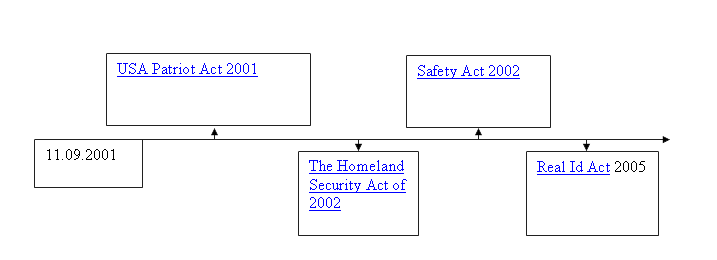Legislature

· USA PATRIOT Act 2001
The USA PATRIOT Act, commonly known as the "Patriot Act", is a statute enacted by the United States Government that President George W. Bush signed into law on October 26, 2001. The contrived acronym stands for Uniting and Strengthening America by Providing Appropriate Tools Requierd to Intercept and Obstruct Terrorism Act of 2001
The Act increases the ability of law enforcement agencies to search telephone, e-mail communications, medical, financial, and other records; eases restrictions on foreign intelligence gathering within the United States; expands the Secretary of the Treasury’s authority to regulate financial transactions, particularly those involving foreign individuals and entities; and enhances the discretion of law enforcement and immigration authorities in detaining and deporting immigrants suspected of terrorism-related acts. The act also expands the definition of terrorism to include domestic terrorism, thus enlarging the number of activities to which the USA PATRIOT Act’s expanded law enforcement powers can be applied.
· The Homeland Security Act 2002
Introduced in the aftermath of the September 11 attacks, created the United States Department of Homeland Security in the largest federal government reorganization since the Department of Defense was created via the National Security Act of 1947 (as amended in 1949). The HSA includes many of the organizations under which the powers of the USA PATRIOT Act are exercised. Among other things, it created the new cabinet-level position of Secretary of Homeland Security.
· SAFETY Act 2002
The Support Anti-terrorism by Fostering Effective Technologies Act of 2002 (SAFETY Act) provides “risk management” and “litigation management” protections for Sellers of qualified anti-terrorism technologies and others in the supply and distribution chain. The aim of the Act is to encourage the development and deployment of anti-terrorism technologies that will substantially enhance the protection of the nation.
· REAL ID Act
The REAL ID Act of 2005 is U.S. federal law that imposes certain security, authentication, and issuance procedures standards for the state driver's licenses and state ID cards, for them to be accepted by the federal government for "official purposes", as defined by the Secretary of Homeland Security. Currently, the Secretary of Homeland Security has defined "official purposes" as presenting state driver's licenses and identification cards for boarding commercially operated airline flights and entering federal buildings and nuclear power plants. The Act is a rider to an act of the United States Congress titled Emergency Supplemental Appropriations Act for Defense, the Global War on Terror, and Tsunami Relief, 2005.